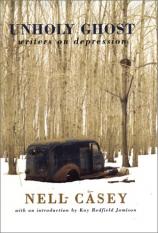Unholy Ghost: Writers on Depression
Review
Unholy Ghost: Writers on Depression
"It's a foretaste of death. It's a trip to the country of
nothingness. Reality loses its substance and becomes ghostly,
transparent, unbelievable," such is a description of depression by
Susanna Kaysen, one of 22 writers in UNHOLY GHOST. This volume of
essays uncovers many facets of the dark disease that destroys or
dampens the lives of millions of adults.
These colorful writers take you through episodes of blackness in
their or their family's lives. Virginia Heffernan tried to blame
low feelings on previous decisions that lead her to her present
world. Then she tried to turn invisible --- changed her hair color
to drab, dressed down, muffled her voice, kept her eyes and head
downcast. This feeling of being absent, invisible, or just thin
inhabits many of the writers at low-spirited times. Several authors
have memories of being depressed from a very young age. From before
the age of eight, Chase Twichell recalls, "I knew I wasn't normal
--- at school there was clear glass between me and the playground,
me and my young fellow humans."
Often the depressive never know what well-being is. Susanna Haysen
believed the pessimistic and depressive view was the real one of
the world. She goes so far as to say that happiness could occlude
her view of the world, and depression allowed a clear view. How
could happiness appear natural to someone who knows no pleasure and
experiences the dark side alone?
Medications and antidepressants are balm to some depressives and a
curse to others. From St. John's Wort to lists of Prozac-similar
drugs, choices are made. Some drugs are untouchable, a bedevilment
to the body, others a savior. Medications work because the body's
chemicals are imbalanced. "It's like a game of telephone, the
message gets lost as it travels, eventually affecting cellular
metabolism…" says Twichell, who also related his being and
thoughts to what pill he was currently taking.
Lauren Slater, balanced on Prozac, wanted a child. The doctors
played risk/benefit, deformity of the child versus Slater's mental
stability. Her fear of the child's deformity won. She stopped her
medication. Soon her depression became intolerable and began to
talk --- how can you care for a baby if you can't care for
yourself? Back on the medicine she went.
Sometimes life crashes before help arrives, and death seems
imminent. Darcey Steinke found safety in her poodle bed, a quilt
swathed around her in the dark or in a closet. "I felt like I had
been found incompetent and fired from my own life." At times, fear
of harming one's self or of wanting to die approach. Edward
Hoagland says, "I emerged from a bad dip into suicidal speculation,
I felt utterly exhausted and yet quite fearless of ordinary
dangers, vastly afraid of myself but much less scared of extraneous
eventualities."
Family members of depressives believe they comprehend until, as in
Russell Banks's situation, he realized that his wife was not in
charge of the depression; it was its own entity controlling her.
Then he knew he could not "claim to feel another person's pain ---
unless…[he's] willing to become that person." But love and
support is invaluable.
Happiness is fleeting and to the depressive nothing about this is a
surprise. Writing can be their salvation. Lee Stringer remarks that
"it seems to me that at least half of what life has to teach us
must come from bouncing off a few rocks." The depressed seem to
have more rocks to smash on, as the illness doesn't allow for a
cheerful bounce. Sometimes life is a stable unhappiness until the
next hard spot presents itself.
For David Karp, "At age fifty-five, I have surrendered myself to
depressive illness. I do not believe I will ever be free of it. For
me, depression is a kind of mental arthritis…" As with
arthritis, we take the pills when one works; use writing therapy;
have supportive families; and live with depression --- until a cure
is discovered. And hope we don't pass it on to our children.
This dark illusion of a shadow of life, or a shadow of death, is an
eye-popper for those who think they understand the depressed, and
an important study for the family of anyone who lives around these
echoes of despair.
Reviewed by Nancy B. Leake, (nbsleake@yahoo.com) on January 24, 2011
Unholy Ghost: Writers on Depression
- Publication Date: March 1, 2001
- Genres: Nonfiction
- Hardcover: 320 pages
- Publisher: William Morrow
- ISBN-10: 0688170315
- ISBN-13: 9780688170318



